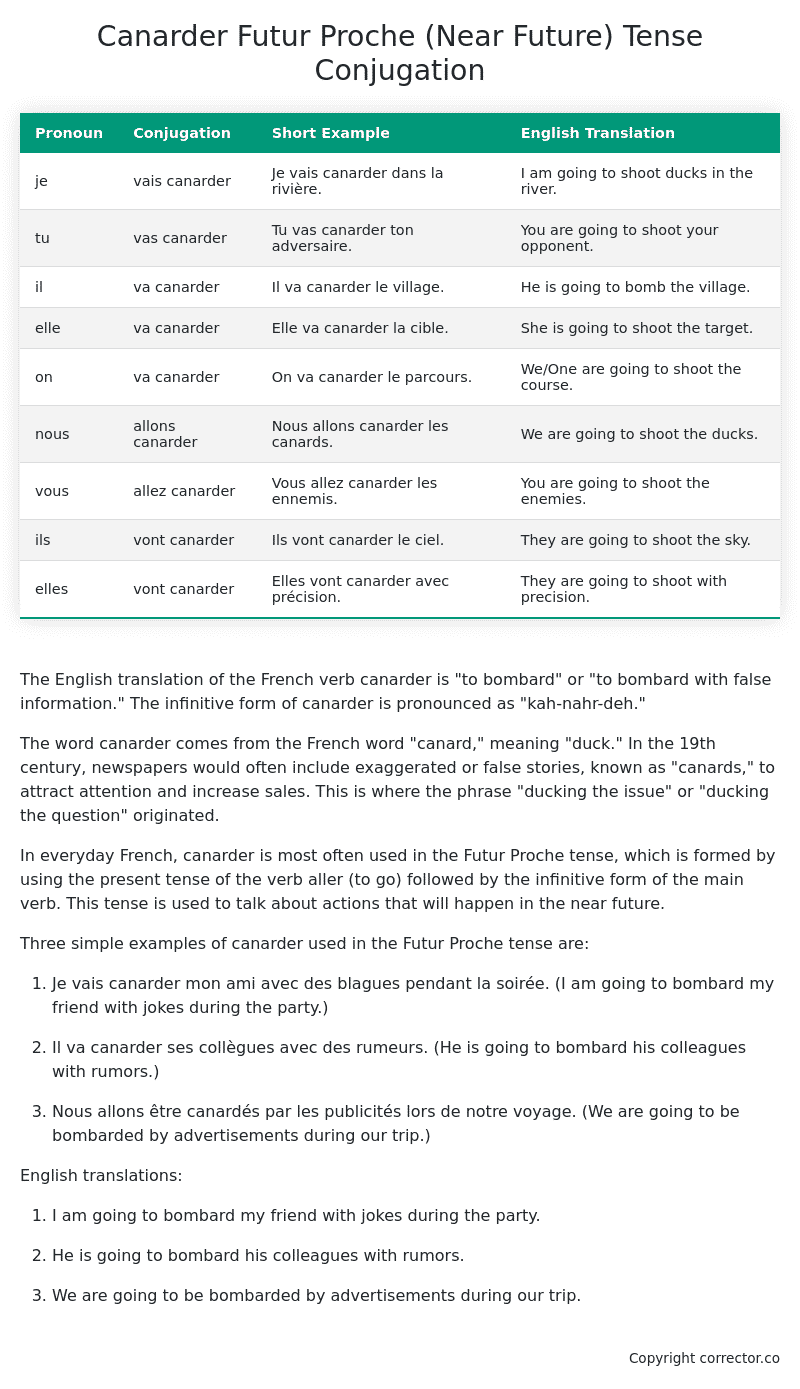Futur Proche (Near Future) Tense Conjugation of the French Verb canarder
Introduction to the verb canarder
The English translation of the French verb canarder is “to bombard” or “to bombard with false information.” The infinitive form of canarder is pronounced as “kah-nahr-deh.”
The word canarder comes from the French word “canard,” meaning “duck.” In the 19th century, newspapers would often include exaggerated or false stories, known as “canards,” to attract attention and increase sales. This is where the phrase “ducking the issue” or “ducking the question” originated.
In everyday French, canarder is most often used in the Futur Proche tense, which is formed by using the present tense of the verb aller (to go) followed by the infinitive form of the main verb. This tense is used to talk about actions that will happen in the near future.
Three simple examples of canarder used in the Futur Proche tense are:
-
Je vais canarder mon ami avec des blagues pendant la soirée. (I am going to bombard my friend with jokes during the party.)
-
Il va canarder ses collègues avec des rumeurs. (He is going to bombard his colleagues with rumors.)
-
Nous allons être canardés par les publicités lors de notre voyage. (We are going to be bombarded by advertisements during our trip.)
English translations:
-
I am going to bombard my friend with jokes during the party.
-
He is going to bombard his colleagues with rumors.
-
We are going to be bombarded by advertisements during our trip.
Table of the Futur Proche (Near Future) Tense Conjugation of canarder
| Pronoun | Conjugation | Short Example | English Translation |
|---|---|---|---|
| je | vais canarder | Je vais canarder dans la rivière. | I am going to shoot ducks in the river. |
| tu | vas canarder | Tu vas canarder ton adversaire. | You are going to shoot your opponent. |
| il | va canarder | Il va canarder le village. | He is going to bomb the village. |
| elle | va canarder | Elle va canarder la cible. | She is going to shoot the target. |
| on | va canarder | On va canarder le parcours. | We/One are going to shoot the course. |
| nous | allons canarder | Nous allons canarder les canards. | We are going to shoot the ducks. |
| vous | allez canarder | Vous allez canarder les ennemis. | You are going to shoot the enemies. |
| ils | vont canarder | Ils vont canarder le ciel. | They are going to shoot the sky. |
| elles | vont canarder | Elles vont canarder avec précision. | They are going to shoot with precision. |
Other Conjugations for Canarder.
Le Present (Present Tense) Conjugation of the French Verb canarder
Imparfait (Imperfect) Tense Conjugation of the French Verb canarder
Passé Simple (Simple Past) Tense Conjugation of the French Verb canarder
Passé Composé (Present Perfect) Tense Conjugation of the French Verb canarder
Futur Simple (Simple Future) Tense Conjugation of the French Verb canarder
Futur Proche (Near Future) Tense Conjugation of the French Verb canarder (this article)
Plus-que-parfait (Pluperfect) Tense Conjugation of the French Verb canarder
Passé Antérieur (Past Anterior) Tense Conjugation of the French Verb canarder
Futur Antérieur (Future Anterior) Tense Conjugation of the French Verb canarder
Subjonctif Présent (Subjunctive Present) Tense Conjugation of the French Verb canarder
Subjonctif Passé (Subjunctive Past) Tense Conjugation of the French Verb canarder
Subjonctif Imparfait (Subjunctive Imperfect) Tense Conjugation of the French Verb canarder
Subjonctif Plus-que-parfait (Subjunctive Pluperfect) Tense Conjugation of the French Verb canarder
Conditionnel Présent (Conditional Present) Tense Conjugation of the French Verb canarder
Conditionnel Passé (Conditional Past) Tense Conjugation of the French Verb canarder
L’impératif Présent (Imperative Present) Tense Conjugation of the French Verb canarder
L’infinitif Présent (Infinitive Present) Tense Conjugation of the French Verb canarder
Struggling with French verbs or the language in general? Why not use our free French Grammar Checker – no registration required!
Get a FREE Download Study Sheet of this Conjugation 🔥
Simply right click the image below, click “save image” and get your free reference for the canarder Futur Proche tense conjugation!

Canarder – About the French Futur Proche (Near Future) Tense
Formation
1. Conjugate “aller” in the present tense according to the subject pronoun:
2. Add the infinitive of the main verb immediately after “aller.” For example:
Common Everyday Usage
Interactions with Other Tenses
Present Tense
Past Tense
Conditional Tense
Summary
I hope you enjoyed this article on the verb canarder. Still in a learning mood? Check out another TOTALLY random French verb conjugation!


